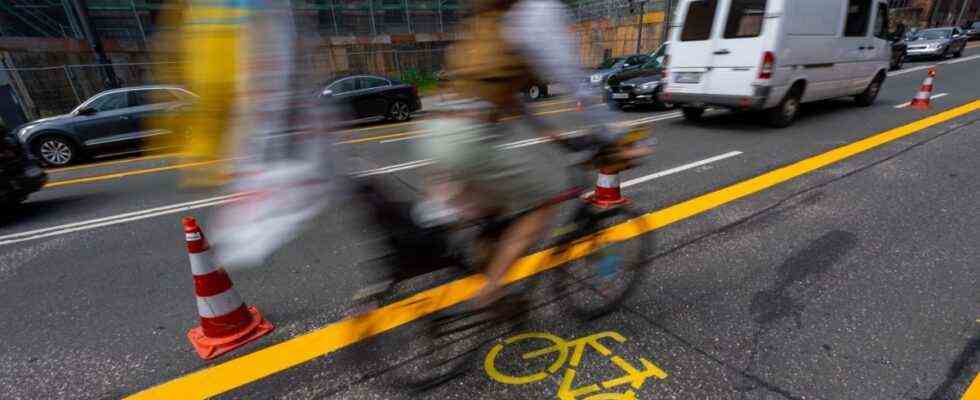The conversion of three pop-up cycle paths in Munich into permanent cycle paths is not legally objectionable. The administrative court decided on Wednesday in Munich. Michael Haberland, President of the Mobil Automobile Club in Germany, went to court “to set an example”. Munich was already the number one traffic jam city in Germany, he said, and then another lane would be taken away from motorists.
The presiding judge Dietmar Wolff on the one hand expressed doubts about the admissibility of the complaint and on the other hand referred to the high volume of traffic on the streets concerned. There one could assume a specific danger for cyclists. Lord Mayor Dieter Reiter commented on the verdict to the SZ: “We can only achieve a traffic turnaround towards environmentally conscious mobility if fewer people drive in and through the city and more use local public transport, on foot or even by bike . This change will certainly lead to further hard disputes. “
In the summer of 2020, the city of Munich installed so-called “pop-up cycle paths” in Theresienstraße, Elisenstraße and Rosenheimer Straße. This means that a lane has been marked with a thick line on the two-lane roads: as a separate lane for cyclists. Because the concept was well received, the city converted the temporary cycle paths into permanently installed ones in spring 2021. Haberland found this incomprehensible. “The main mode of transport is and will remain the car,” he said before the trial. In Elisenstrasse alone, you can see a constant traffic jam every day.
There are defined load levels that indicate whether a cycle path is necessary or not
De facto, according to the Munich traffic volume map, 26,000 cars rushed through Elisenstrasse in one day in 2019. This year it should be around 21,400. In contrast, the number of cyclists has increased, which is also likely to be related to the corona pandemic. In a “peak hour on weekdays” namely by 49 percent from 1864 to 2767. According to the city’s figures, there has even been an increase in “muscle-related traffic” of 260 percent on Theresienstraße. While in 2013 there were still 365 cyclists through Theresienstraße, this year there were a good 1,300.
Theresienstrasse was a borderline case. Since almost everything is regulated, there are also defined load levels that indicate whether a separate cycle path appears necessary. And Rosenheimer Straße and Elisenstraße are clearly in load level 3. What does that mean: There is a lot of traffic here, the danger for cyclists increases here, and a separate lane for cyclists should be set up here. Theresienstraße, on the other hand, commuted between 2 and 3. But according to the city, a combined footpath and bike path is not realistic here, especially since there are many free bar areas, museums and bus stops in the area.
“We will not review any local political decisions in detail,” announced Judge Wolff at the meeting. The verdict of the 23rd Chamber was then short and painless. According to the figures presented by the city, there is a specific danger in these streets for cyclists. In addition, the court generally doubts the admissibility of the action. Haberland could not sue as chairman of the association, but only in person. “To what extent are you personally confronted with these streets?” Asked the court. Haberland stated that he was regularly on these roads and had noticed the dilemma of permanent traffic jams. “We have doubts about the legal standing”, said Wolff, “if it is only about the traffic jam and the waiting time”.
The Greens still want to rededicate many lanes
After the verdict, mobility advisor Georg Dunkel sees himself confirmed that the city is on the right track: “The safety of cycling on these three road sections outweighs the interests of individuals.” Andreas Schuster, bicycle policy spokesman for the SPD / Volt parliamentary group in the Munich city council, said “only if we redistribute our streets can we make Munich healthier and more livable and develop the city sustainably towards climate neutrality.”
And city councilor Gudrun Lux (The Greens / Pink List) announced that “many more bike paths will be built and lanes will be rededicated”. So far, the city has converted four pop-up cycle paths into permanent strips.

